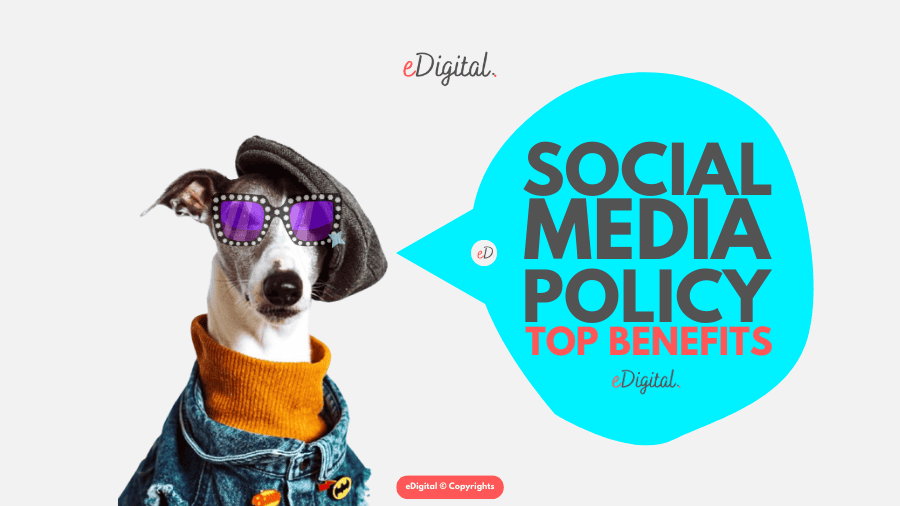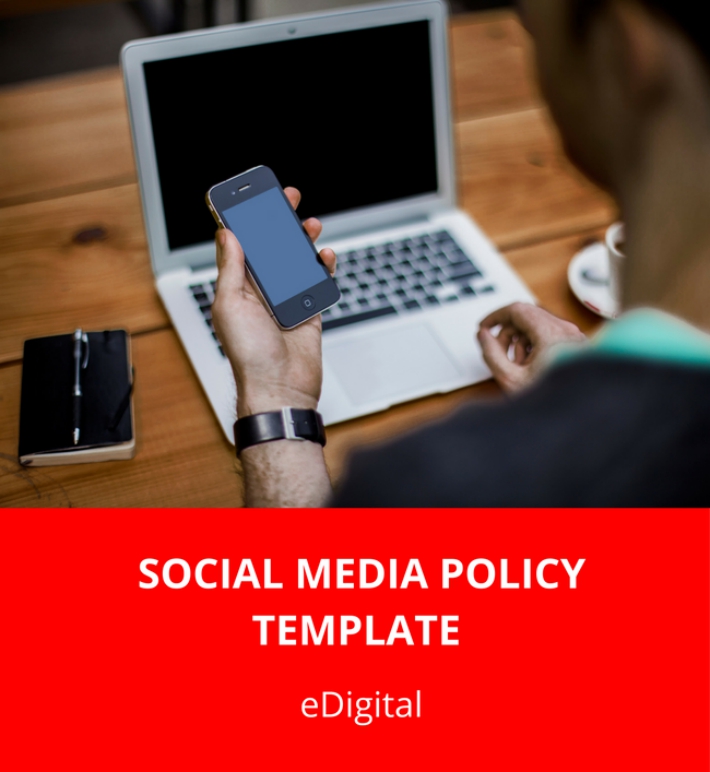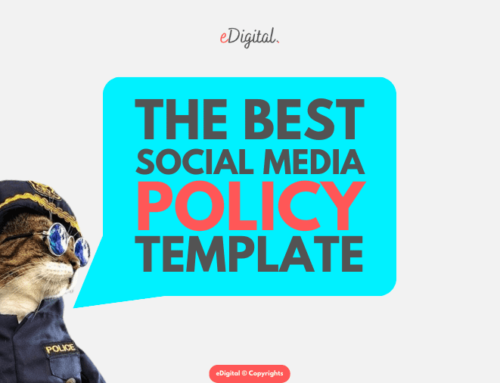THE TOP 19 BENEFITS OF A SOCIAL MEDIA POLICY
The top 19 benefits of a social media policy. The benefits of writing and implementing a social media policy for your organisation.
Brought to you by Mau, a Senior Social Media Marketing Specialist at eDigital
THE TOP 19 BENEFITS OF A SOCIAL MEDIA POLICY
A “Social Media Policy” for employees or a “Social Media Guidelines” is a document written by Marketing, Human Resources or lawyers that provides a standard of acceptable professional and personal online behaviour for employees when talking about the company, its brands, employees, activities and intellectual property.
A social media policy document can be both a public document accessed via the internet on a public company website, privately via a company intranet or physically via reading a printed copy accessed via a tea room or another area within your workspace.
A social media policy should be of easy access by any employee, franchisee and contractor at any given time. This document is the “true” source when someone at your company is not sure what, when, and how they can talk about your company, your employees and its products and services via social media platforms.
The top 19 benefits of a well-written social media policy
By adopting and implementing a well-drafted and communicated social media policy, your company staff can enjoy the advantages of social media while mitigating the associated risks. Below are some key factors when drafting your social media policy/guidelines.
19. Avoids legal scandals
In 2015, Chipotle’s gaffe lost a lawsuit for firing an employee who posted negative items on social media. The court found Chipotle’s social media policy violated labour laws. Work with your legal team to update your policy so it gets updated with legal changes coming out of your Trade Commission and any relevant Labor Relations Board. Your old policy needs to reflect the current legal standards. For instance, the USA FTC has clear guidelines regarding disclosures and endorsements. See how those affect your social media marketing.
18. Addresses social media crisis management
A well-written social media policy makes it clear who is responsible for speaking on behalf of the brand in such a crisis and what response is appropriate (i.e., when to stay silent, how to express condolences and what kinds of information to pass on).
17. Addresses angry customers and/or trollers
A well-drafted social media policy makes it clear that arguments are never appropriate; that customer service issues should be passed to the right department and outright trolling should be ignored.
Related > The best 9 steps for writing a successful social media policy.
16. Sets expectations of privacy and appropriate behaviour
Remind employees that public posts on social media are reflective of the individual and the brand by proxy. For example, if an employee posts profanity-laden rants or political memes, that could hurt the business. Offer a brief explanation of how major social media platforms’ privacy features work, and how to restrict personal posts to friends only. Encourage mindfulness in choosing who to follow and accept as a follower, and encourage employees to separate personal and professional profiles.
15. Reinforces the company’s culture
Your company’s brand guidelines and culture should be a driving force in social media interactions. What company values do you want to project? Let employees know that they are responsible for upholding these values in all their social media communication. In general, it’s good to promote transparency, honesty and respect for individuals. That means being truthful about the brand and its competitors and never trashing other people or companies.
14. Reflects duties imposed by law
Your company and your employees have a variety of legal obligations under anti-discrimination and anti-bullying laws, and these aspects should be covered in your policy so that your employees are familiar with the legal requirements.
13. Protects the ownership of your social media accounts
A social media policy clarifies who owns the organisation’s social media accounts and their forfeiture upon termination of the employment relationship.
12. Protects intellectual property
Your business name, logo and slogan all constitute your intellectual property, which can be damaged and devalued if misused. Your social media policy should remind employees that your intellectual property is valuable and that their unauthorised use of it would likely result in real damage, including financial damage. Break down any misinterpretations about what is considered IP (Intellectual Property) and what it is not.
As the Society for Human Resource Management (SHRM) explains, a social media policy may help safeguard sensitive data from potential hackers and online scams, especially in a bring-your-own-device environment. Employees should also know that proprietary information about the company must never be shared – another aspect that needs to be regularly updated as the business grows. Protect your company’s information by identifying what is considered confidential, such as marketing tactics, non-public financials, future product launches and other “for internal use only” communications. Check out GM’s social media policy to see how the company spells it out for its workers.
11. Defines the acceptable level of engagement on social media
Encouraging social media interaction from employees can be a slippery slope that leads to employees not managing their time in the most productive way possible. Make sure you have an appropriate Social Media Policy or Guidelines in place to ensure employees are aware of the acceptable level of social media engagement. You might want your lawyer to check your Social Media Policy and add it to an Internet Use Policy, as well as into the employment contracts.
Marketers are also reading the best 9 steps for writing a successful social media policy.
10. Avoids negative social media commentary from employees
Failing to have the appropriate regulations inserted into your Social Media Policy can result in employees inadvertently or purposefully publishing bad commentary about your business. This can hugely damage your business’s reputation and has the potential for defamation claims against your business.
To make things worse, if the comments are damaging a competitor, it may result in anti-competitive behaviour claims, which can result in large legal costs. A well-structured Social Media Policy should account to avoid this kind of behaviour.
9. Controls negative commentary about your organisation
It is not hard to imagine employees having an argument with their boss and then resorting to social media to vent their frustrations about your company. This can lead to employers wanting to terminate their employees’ employment contracts. This area is seldom dealt with in the Courts, so make sure you consult your lawyer before you fire an employee for this kind of behaviour. A well-crafted social media policy ensures all employees are aware of the risks of making a public negative comment about your company.
⭐️⭐️⭐️⭐️⭐️ Useful template
I needed to find a great template for writing the first draft of a new social media policy and found this template extremely useful his template has helped us manage employee conduct on social media and ensure compliance.
Tod C. ✅ Verified user
8. Guides employees on best practices
With practical and real best practice examples including comments about your company’s activities, assets, brand names, IP and employees. This will clear up any doubts and minimise the use of penalties and warnings to employees because of their social media commentary.
With the new advent of real-time video commentary, more companies and employees’ behaviour are being scrutinised by the media, customers and the government.
Social media commentary in most cases is fun, and helpful but can also be dangerous and can backfire on your company’s good reputation and trust levels. Employees’ comments, notes and photos posted on social media sites such as Facebook, Twitter and online forums are usually constructive and positive. But negative comments and images, bullying, criticism, sexism, political, confrontational or racial remarks can be dangerous and harmful to the well-being and reputation of your company and its brands.

Spice Jet – Indian Airlines controversial polemic tweet – sexist women objectification December 2022 – The post was immediately removed after women’s organisations started to complain about it.
A social media policy should let employees know how valuable their voice is to the business and your customers. Encourage them to share their unique perspective and insight, to find the brand-boosting stories only they can tell. Encourage them to promote their co-workers as well, sharing congratulations on each other’s achievements and fostering community.
7. Minimises negative commentary
A well-drafted social media policy can minimise comments made by an employee, franchisee or contractor via social media.
Your employees’ voice and tone about your company – via social media – must be the most appropriate.
Great well-written social media posts decrease the chances of a small comment becoming unfavourable negative publicity for your company.
6. Ensures what sort of topics should be avoided
Once a comment is posted on the internet and it is being picked up by the media; it will be almost impossible to delete it.
Your employees must be trained on the best social media practices for professional usage or brand ambassador usage, especially when commenting online about things related to work, your company and your team members.
5. Clarifies the official public spoke person.
and/or brand ambassadors who are the ones talking to the media.
⭐️⭐️⭐️⭐️⭐️ Fantastic template
This top template has helped us manage employee conduct on social media and ensure compliance.
Stuart M. ✅ Verified user
4. Ensures staff understand their social media role
when they are representing the business via social media channels.
Only 51% of employees report that their workplace has rules about social media use at work, according to a recent Pew Research Center survey—which means half of the workforce is potentially at risk for litigation and security breaches.
Legal problems can arise for businesses if employees say something negative about the company, reveal confidential information, or say something positive about the company without disclosing their affiliation.
3. Promotes well-drafted employee advocacy
Your business can make the most out of Employee advocacy via social media commentary. Suggesting your employees promote your business’ content via your employees’ social media accounts can result in more brand trust.
While it might be obvious that posting illicit, offensive or insensitive material on a company-branded social media page is not a great idea, it still happens.
For the people running social for your company, what checks and balances are in place to avoid a public relations disaster? Are the rules different for each platform?
Make it easy to understand how employees will be held accountable for what they post on their social media accounts and who will monitor that. Be as specific as possible in your social media guidelines.
2. Clarifies who owns what (especially when employees leave)
It is a huge risk to employers when ex-employees social media accounts contain confidential business information, such as client numbers and details, and the employees continue to communicate with these clients. Your Social Media Policy should account for these risks by inserting an intellectual property clause into the Social Media Policy that states that all intellectual property, at the termination of employment, will remain the property of the employer. If left unchecked, this can easily result in litigation due to the complexity of the ownership issues. While in most cases it is understood that client lists remain the property of the employer following termination of the employment relationship, the lines between ownership of social media accounts are blurry at best, such as when the client list being claimed is a list of followers on the employee’s social media accounts.
1. Protects your organisation from legal battles.
In case a former employee sues your company for “unfair” dismissal. You can fight that your company was clear and explain a comprehensive ‘Social Media Policy”. Without these, it could be difficult if you wish to terminate an employee for inappropriate use of social media. The Fair Work Commission will notice this.
“It’s not the social media platforms that create issues for organisations, it’s the way employees and staff use social media. It’s about managing your team, not the tool”
Mau – eDigital‘s Digital Marketing & Social Media Specialist and training facilitator
How to get this premium social media policy template
This is a premium template you won’t find anywhere else. Once payment is completed via Paypal, Paypal will automatically re-direct you to a page where you can find the template. Any issues, you can always contact us.
A social media policy is not a new concept.
Organisations around the world have been introducing social media policies, especially in the last year’ as social media communication has become more popular as not only a way to promote a business but also as a way to communicate with different parties including customers, partners, media, providers and even detractors.
As a company leader, you have the power to change your team’s attitude and support system around social media usage for the better and at least one of your team members is waiting for you to realise it.
The time is now! Get our exclusive and premium Social Media template and start writing your first draft.
Popular this month: Social Media Training for Government employees
How to use this best social media policy template
- This social media policy template has been designed for easy editing on Microsoft Word so it is easy for you to modify it as you wish.
- Ensure your final Social Media Policy is saved as a PDF or any other secure file so no one can modify it without your approval.
eDigital also offers Corporate Social Media Training for employees. Contact us.
⭐️⭐️⭐️⭐️⭐️ Made it easy
The template made it easy for our team to provide guidelines and requirements for social media usage.
Freya P. ✅ Verified user
Ideally, effective social media policies should be fluid and responsive to the fast-paced digital world. But at the very least, taking the time to perform a yearly review can check the validity of your guidelines, save your employees a lot of confusion — and help your company avoid potential pitfalls.
This professionally crafted template has been used by top marketers already using some of the best CRM marketing software.
⭐️⭐️⭐️⭐️⭐️ Top template
The template helped us kickstart our first Social Media Policy draft in minutes. We did not have to figure out what we should be writing.
Milly Z. ✅ Verified user
Get your Premium Social Media Policy Template today!
Next: the best 9 steps for writing a successful social media policy
Conclusion
Crafting a good social media policy can be tricky since it has to include legal considerations, brand guidelines, and your employees’ needs.
Keep in mind the goal is not to restrict their sharing to a handful of approved corporate messages.
Rather, your guardrails should give them the creative space and encouragement to hit the road for your company. When your employees advocate for your company responsibly, they bring humanity to your brand and help further their professional development at the same time.
Personal use of social media is not private. Appropriate regulation of your employees’ personal social media use is acceptable and enforceable.
Social media policies are an excellent way for businesses to regulate a technology that can harm them. Mastering your business’ social media policy implementation, content and enforcement will ensure that your business maintains a strong and positive online presence.
Final note: Are your marketing costs through the roof?
If your customer acquisition costs are climbing faster than a startup tech bro’s ego (after a successful IPO), and you’re hooked on paid ads like a reality TV star drama or like your Tinder date who keeps accepting your dinner invites but never calls you back, we need to talk.
Our exclusive digital marketing strategy workshops will mercilessly dissect your marketing (like Massimo Bottura with the best Japanese knife), expose all the weak spots, and show you how to ditch the social media algorithms chokehold and build a marketing engine you actually own.
We’ll shake up your team’s thinking, drop fresh ideas and turn your marketing from “meh” to money-making.
Ready to stop burning cash and start making it? Hit us up! We offer:
🔥 Digital Marketing Strategy. Because hope is not a plan.
🔥 Online Ads (Google, Social, Remarketing). The art of spending money wisely for once.
🔥 Social Media Marketing Training. So you stop posting into the void.
🔥 SEO Strategy & Execution. Because if Google doesn’t know you exist, do you even?
🔥 Influencer & Celebrity Marketing.Get people with clout to talk about you.
🔥 Branding & Logo Design. So you don’t look like a dodgy side hustle.
🔥 Consumer Giveaways & Competitions. Because people will do anything for free stuff.
🔥 Email Marketing & Drip Sequences. Slide into inboxes the right way.
🔥 Conversion Rate Optimisation. Turn window shoppers into actual buyers.
Ready to start marketing like a boss? let’s talk. 🚀
THE TOP BENEFITS OF A SOCIAL MEDIA POLICY
Considered one of the best marketing consultants in Sydney (and not just by Mau’s mom), Mau delivers killer digital marketing strategy workshops and best social media training so good, even your grandpa will get it.
5k+ smart marketers who love stealing good ideas receive Mau’s weekly email, while others tired of guessing use Mau’s Digital Marketing Plan and Social Media Plan templates.
Mau is currently gallivanting around the 🌎 ✈️ probably posting questionable travel choices on TikTok and YouTube





